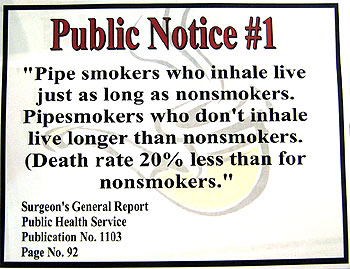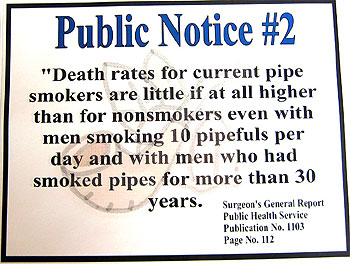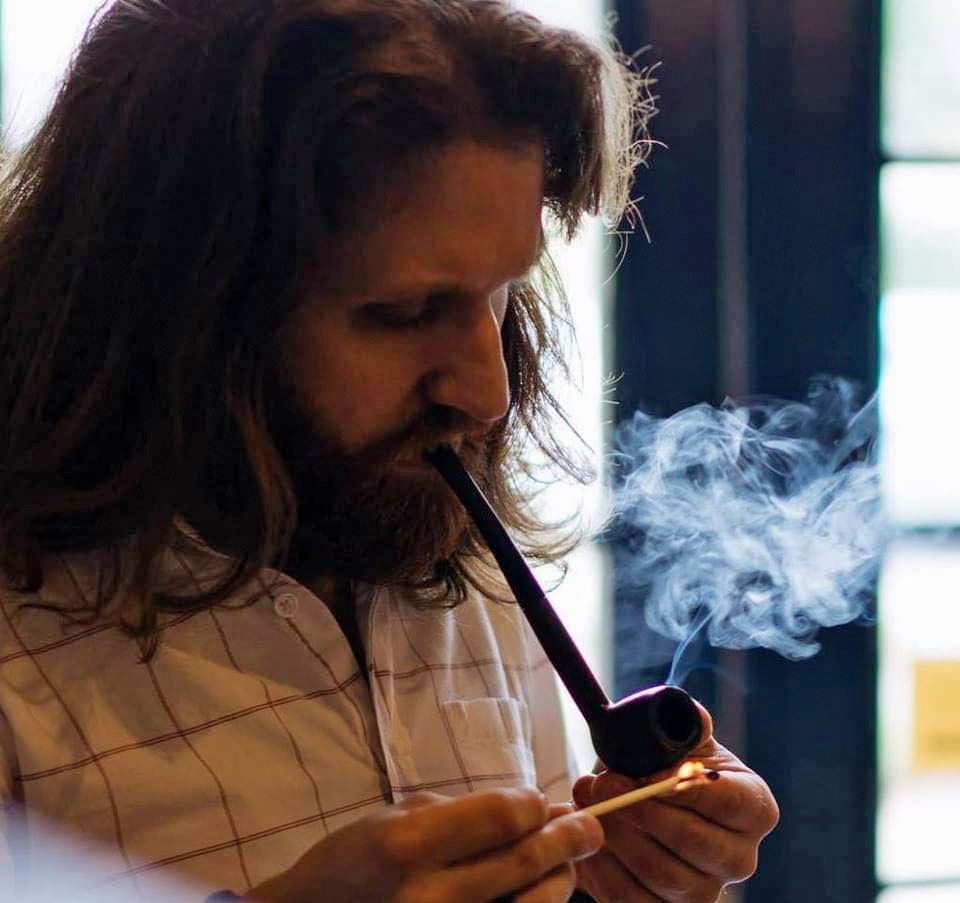By C. R. S. Lyles
 Just the other day, I turned on my television and ran across a commercial promoting an anti-acne product called Epiduo. Throughout the entire length of the commercial, the mantra of "don’t blame yourself; blame biology" was repeated multiple times, and I couldn’t help but see a parallel between this very phrase and the reputedly-negative health aspects which have always been synonymous with smoking.
Just the other day, I turned on my television and ran across a commercial promoting an anti-acne product called Epiduo. Throughout the entire length of the commercial, the mantra of "don’t blame yourself; blame biology" was repeated multiple times, and I couldn’t help but see a parallel between this very phrase and the reputedly-negative health aspects which have always been synonymous with smoking.
But how negative are they really?
We as a society have always taken the inherent risks of smoking at face-value, confident that the authority figures and so-called experts know what they are talking about when they tell us how smoking will lead to disease and death.
But, as with all authority figures in a post-Nixon America, taking their word at face value is the surest way of ensuring that you’re going to be lied to.
For example, let’s take a look at the country of Japan.
 Out of the top fifteen countries in the entire world who smoke, Japan has the highest percentage with a whopping 59% of the country’s male population. The life expectancy rate is just under 77 years, and yet the lung cancer death rate (LCDR) for Japan is only 0.5% of the male population.
Out of the top fifteen countries in the entire world who smoke, Japan has the highest percentage with a whopping 59% of the country’s male population. The life expectancy rate is just under 77 years, and yet the lung cancer death rate (LCDR) for Japan is only 0.5% of the male population.
How is this possible?
In his 2003 book In Defense of Smokers [Free Download], author Lauren Colby spoke with the infamous Ernst L. Wynder (who you may remember as one half of the research team who effectively began this post-modern witch-hunt with the publication "Tobacco Smoking as a Possible Etiologic Factor in Bronchiogenic Carcinoma", and the implications of what he discovered when he questioned him about his 1991 article titled "Comparative Epidemiology of Cancer between the United States and Japan" are staggering to the entire world’s population of smokers.
"The bottom line, however, was the concession of Dr. Wynder that the data did not support smoking as a cause of lung cancer in Japan. According to the authors’ own figures, the lung cancer rate among Japanese males is less than one third the rate among U.S. white males, and as early as 1955, 81.4% of Japanese men were smokers (compared to 52.6% in the U.S.)."
Now, for you history buffs out there, the issue of smoking in America can pretty much be traced back to one pesky little Reader’s Digest article whose implications were studied by both Wynder and his colleague, Evarts Ambrose Graham.
 And, unfortunately for all the anti-smoking activists out there, a concession such as Dr. Wynder’s that the effects of smoking do not always lead to developing lung cancer is pretty much akin to Charles Darwin renouncing evolution on his death bed.
And, unfortunately for all the anti-smoking activists out there, a concession such as Dr. Wynder’s that the effects of smoking do not always lead to developing lung cancer is pretty much akin to Charles Darwin renouncing evolution on his death bed.
Now, while we’re on the subject of the socially-accepted mythology regarding the effects of smoking on one’s health, let’s revisit the exact phrasing used in the equally infamous 1964 Surgeon General’s Report.
"Nicotine is rapidly changed in the body to relatively inactive substances with low toxicity. The chronic toxicity of small doses of nicotine is low in experimental animals. These two facts, when taken in conjunction with the low mortality ratios of pipe and cigar smokers, indicate that the chronic toxicity of nicotine in quantities absorbed from smoking and other methods of tobacco use is very low and probably does not represent an important health hazard."
To clarify for the kids in the back seats, smoking cigarettes will probably end up killing you in the end. I myself am a cigarette smoker, but have no illusions about what I put into my body or believe that cigarettes are healthy in any way whatsoever.
But pipe tobacco and cigars are different.
"Death rates of cigar smokers are about the same as those of non-smokers for men smoking less than five cigars daily…Death rates for current pipe smokers were little if at all higher than non-smokers, even with men smoking 10 or more pipefuls per day and with men who had smoked pipes for more than 30 years."
 |
 |
The point is this: smoking tobacco is not going to give you lung cancer 100% of the time.
 In his book, Lauren Colby goes on to say that "We have a new disease, Chronic Onstructive Pulmonary Disease (COPD), the exact cause of which is unknown (indeed, the definition of the disease is vague; it seems to be a case of "this patient has something wrong with his lungs, but we don’t know exactly what"). Cigarette smoking is thought to play a role; yet [it is] clear that many cigarette smokers never develop this disease, and the authors do not know why. I submit that the reason is very simple: smoking does not cause emphysema."
In his book, Lauren Colby goes on to say that "We have a new disease, Chronic Onstructive Pulmonary Disease (COPD), the exact cause of which is unknown (indeed, the definition of the disease is vague; it seems to be a case of "this patient has something wrong with his lungs, but we don’t know exactly what"). Cigarette smoking is thought to play a role; yet [it is] clear that many cigarette smokers never develop this disease, and the authors do not know why. I submit that the reason is very simple: smoking does not cause emphysema."
Further proof of the inherent laziness of our public officials is evident in the revelation that "Every year, the government releases figures on the number of ‘smoking-related deaths’ in the United States…Most people assume that there is some scientific basis to that figure. Not so! The government ‘scientists’ simply take a flat percentage of the number of people who die from a particular disease, and assume that to be the number whose death was caused by smoking. There are no autopsies, no studies on actual human beings."
This is what my tax dollars are going to? I work and fulfill my necessary little role in this grand society so some pretentious dweeb with a God complex can assume that the smoking-related deaths number somewhere around 500,000 a year?
The proof is in the pudding, they say, but nothing really says it better than Lauren Colby’s statement that "To this day, it remains unconfirmed and it remains true, that despite hundreds of experiments, nobody has been able to induce a single cancer in lab animals by exposing them to ordinary tobacco products or smoke."
Smoking is not a definite indication of an early death; in fact, the assumption that smoking tobacco can kill you has only been present since the 1950s. Before then and around the entire globe, tobacco was considered medicinal, calming, and even holy to some cultures. The negative health aspects that can derive from smoking are not guaranteed, but really are based more on one’s biology and quality of life rather than on tobacco.
Just look at the data: Cuba has a 49.3% prevalence of male smokers and a life expectancy of just under 75 years. Ironically, Cubans are predicted to outlive Americans by two or more years, yet are socially-identified with tobacco via their world-famous cigars. France, whose people are so stereotypically type-cast as chain-smokers, have a 40% prevalence of male smokers and a life expectancy rate of 74 years.
The United States has only a 28% prevalence of male smokers, but a life expectancy of just under 73 years.
Looks like the smokers of the world may be on to something, huh?

Carter R. Lyles is a student at the University of Central Florida in Orlando, FL and at the University of Florida in Gainesville. He is a journalism/psychology major, and in addition to his work at Pipes Magazine, he has contributed articles to The Alligator, Thursday Night Magazine, and The Fine Print. |

.gif)
















Excellent article, Carter!
Great Article!!
Why aren’t articles such as this reported by the media? Politics and money?
Wonderful piece! Thank you.
Wonderful piece! It’s amazing what happens when those anti-smoking figures are confronted.
very nice.
Why doesn’t the media report it? because the antis pay a lot of dollars for commercials against. we’d have to spend just as much to advertise for it.
I’d be extremely interested in any reports from the last 10 years. Whilst this is an excellent article, the Surgeon General’s 1964 report is perhaps a little out-dated. Going to pass this round the sceptics though!
The UK’s own anti-smoking advertisments now tend to go with the phrasing “smoking-related” – As in, dead smokers who happened to die of things that are commonly associated with smoking.
Great article! Everything seems to be so true, it seems nearly impossible to argue against it! But, I am dumbstruck; every time you try and say something of the sort to an anti your only met with arrogant smirks and smug chuckles and shaking heads. I cannot find a reason not to agree with you Carter, and that is not only because I love smoking a pipe, but because you make perfect sense, this can only mean that the antis are (for the most part) arrogant idiots!
Well written, Carter, and well researched.
As a scientist myself, I can explain why there exists such an abundance of anti smoking scientific studies; MONEY.
Truth is, it costs a lot of green to get a diploma in a scientific field from a decent college. Once graduated, the budding scientific mind quickly discovers that there is no ready market for his specialty except for what little grant money that can be found. Grant money, though available, cannot be considered a guaranteed source of income unless the researcher provides the “expected” result. Don’t get the expected result, don’t expect a nother grant.
Without going through the whole “figures don’t lie but liars do figure” routine, let’s just say that any batch of numbers can be coerced into any result through creative massage. Look into any anti- research and you will find a variety of skews that have affected the outcome: contrived populations, lack of background research, lack of continuity of data. It is aparent that the money for research is pointing in the “anti-” direction and the researcher who wants to keep his family fed will be looking in that direction also.
Once again, carter, thank you for your open mind.
One of the most revealing pieces of well documented information from Mr. Colby’s book, cited in this article: due to the anti-smoking campaign, smoking has declined yet the lung cancer death rate has increased. Is there a link? I don’t think so.
.
Over all I think Mr. Simmons comment above is the most cogent I’ve heard during this entire discussion. It reminds me of the fiasco caused by “scientists” fudging the data on global warming. BTW, Al Gore has been keeping a pretty low profile lately; maybe he can get a job crusading against smoking (if he isn’t doing so already!) 🙂
Nice job, Carter. This is the first I’ve heard anything from the Surgeon General’s report and non-hard scientific data available. I agree with the comment made by Capnbellamy about a definite interest in seeing any scientific studies done within the last ten to twenty years.
My wife is very sensitive to the present information about “second-hand smoke”, but does not insist I do no pipe smoking in the house.
To find any more current info from the Surgeon General’s office might be quite a challenge, especially without research methodology knowledege. Perhaps I shall do a little scratching.
@ capnbellamy & tatanka re: more recent reports vs. older reports.
I trust the older reports more than the more recent information from the surgeon general’s office.
Back in the 50’s & 60’s, even though tobacco was already being vilified, it was nowhere as bad as it is now, which slants the more recent info much harder against tobacco.
Read this from just 6-months ago, and then tell me if you still want to trust anything recent from the Surgeon General.
http://greenhellblog.com/2010/12/12/surgeon-general-jumps-the-shark/
I think I was told that the information you see above in the two notices about how pipe smokers were shown to be better off than non-smokers was actually removed from the report later on because the antis didn’t want it there.
I think the source of that information is in the book, “For Your Own Good” by Reason Magazine’s Jacob Sullum.
Well said.
Maybe: “what this world (really does) needs is a good 10 cent cigar.”
Quote “capnbellamy said:
I’d be extremely interested in any reports from the last 10 years. Whilst this is an excellent article, the Surgeon General’s 1964 report is perhaps a little out-dated. Going to pass this round the sceptics though!
The UK’s own anti-smoking advertisments now tend to go with the phrasing “smoking-related” – As in, dead smokers who happened to die of things that are commonly associated with smoking.”
I think, if anything that report is understated! There are probably more additives added to cigarettes than there were back then. Therefore possibly more deaths related to cigarettes versus pipe smoking related deaths.
As to the UK maybe they are saying the deaths are related to ashtrays?
Great article, even better subject.
Hey Zuni, is that “as in being hit over the head with an ashtray?” 🙂
Re: Nicotine benefits.
http://dengulenegl.dk/English/Nicotine.html
Great article, Carter. For updated “reports”, look to the source of all the current anti legislation: the WHO’s Tobacco-Free Initiative http://bit.ly/mBy724 . It’s a much catchier slogan than a “war on tobacco”, which has become passe what with the current global conflicts bringing everybody down. Even a casual reading will highlight the fact that most of the statistics cited are little more than agenda-based assumptions.
Very thought provoking article!
Great article. Its like i’ve always said. where are the statstics of smokers who dont die from “smoking related illness”
I grew up in a home where my parents and extended family smoked cigars, pipes and cigarettes constantly. If second hand smoke were as bad for one’s health as the Surgeon General’s office implies, we should all have been dead long ago. That’s me, and my other six siblings! Let’s tell the truth: society in general has become more and more intolerant. Look at the most recent outdoor smoking ban in NYC. Outdoor smoking has never been shown as any threat to health, but antismokers are so angry and vehement that any whiffl of tobacco is viewed as a personal assault.
Maybe a way out of this mess is to outlaw tobacco, as an experiment. Then the government would lose billions in tax revenue and we could form speakeasies for smokers. Problem is, the current generation of pleasure-hating idiots didn’t live through the Prohibition Era, which gave us Organized Crime, so they haven’t learned any lessons about why prohibitionism ultimately doesn’t work. Human beings like to smoke, drink, gamble, and some even like to do drugs. This has been true since humans existed. Why can’t we accept this?
Great article, Carter. I always thought that this anti-tobacco campaign is a kind of witch hunt, just to give people something to blame.
Great article, thanks!!!
A further comment:
Excellent article. I wouldn’t be surprised at all if, when the whole truth is known about death from any type of cancer, that obesity is the main cause. Interestingly, one of the major differences between Americans and the Japanese is, we’re fatter than them. That may account for a longer life expectancy in a country with more smokers overall than the USA.
I like the compare and contrast between the thoughtfulness and factual nature of this article and the new packaging campaign waged by the anti’s. When you can’t sway with a message based in reality, always throw disturbing images at it.
Great article!
Are you also aware the CDC requires doctors to list SMOKING as the cause of death if the decedent has ever smoked and dies from a disease the CDC associates with smoking. This is the best way ever to get statistics to say what you want them to say. Control the raw data.
Great article..thanks!
Those silly facts, always messing up everybody’s preconceived notion of evil.
I would like to note that the story about Darwin recanting is a false story that was spread by one Lady Hope, while Darwin’s daughter, who was with Darwin throughout all of his last days, says Ms. Hope never even visited Darwin.
Man i loving it and it is good to get the other side of the story!